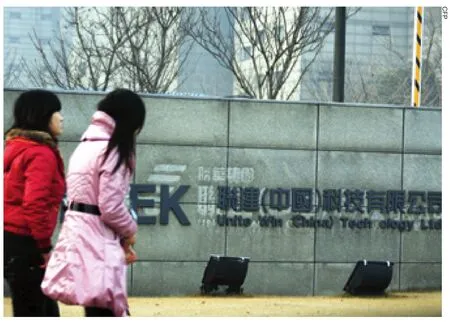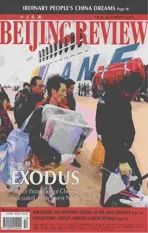A Poisonous Apple
2011-03-15YINPUMIN
While Apple Inc. is enjoying hot worldwide sales of its fashionable electronics, its health and environmental responsibilities through foreign subcontracts have come under fire

A TROUBLESOME PLACE: Two women pass by the front gate of United Win Technology in Suzhou, Jiangsu Province, on February 18. More than 130 workers at the supplier factory of Apple Inc. suffered chemical poisoning from the manufacturing process in recent years
By YIN PUMIN
Chinese workers suffering from a chemical poisoning at United Win Technology, one of Apple Inc.’s supplier factories at the Suzhou Industrial Park in east China’s Jiangsu Province, met with the factory’s leaders for the first time on February 26.
The factory, which is owned by Taiwanbased Wintek Corp., promised to provide aid if the workers’ symptoms reoccur in the future. But such a response failed to bring thorough relief to poisoned workers.
Jia Jingchuan, a 27-year-old production technician at United Win Technology,told Beijing-based Legal Daily the promise would remain empty once the factory was dumped by its parent company.
“Further, we haven’t got any formal written apology from the company as we demanded,” Jia said.
Scandal again
On February 15, Apple released its Supplier Responsibility Progress Report 2011.
The report is based on survey results to the company’s 127 suppliers. It shows in 2010, 37 suppliers were found to engage in behavior that seriously violates Apple’s rules, compared to 17 in 2009.
Meanwhile, Apple acknowledged for the first time 137 workers at the Suzhou facility of Wintek, one of Apple’s touch screen suppliers, had suffered adverse health effects following exposure to hexyl hydride, also called n-hexane, a chemical in cleaning agents used in some manufacturing processes.
The report said Apple considered this series of incidents to be a core violation for worker endangerment and required the factory to stop using the chemical while it improved its ventilation system.
“Since these changes, no new workers have suffered dif fi culties from chemical exposure,” it said.
The California-based maker of iPods,iPhones and iPads, also said it required Wintek to work with a consultant to improve its environmental health and safety processes and management systems, and it was monitoring the implementation of these corrective actions and preventive measures. A complete re-audit of the facility will be conducted in 2011, it said.
“It is a little bit late for Apple to address the poisoning issue,” said Ma Jun, Director of the Institute of Public and Environmental Affairs (IPE), a Beijing-based nongovernmental organization (NGO).
Media first shed light on the issue in 2009, but Apple did not mention it in its 2010 fi scal report, showing it had weak control over its suppliers, Ma said.
Lang Juming, an of ficial for social affairs at the Suzhou Industrial Park, told Xinhua News Agency the park gave clear notice two years ago to tenant factories that they could not use n-hexane, and all the companies signed letters of commitment.
But, in August 2008, United Win Technology decided to switch from alcohol to n-hexane for cleaning because it dried more quickly and could speed up the production of touch screens for Apple products,according to later investigations by the local government.
“It now appears that we cannot believe the commitment made by enterprises,” Lang said.
Jia, the production technician at United Win Technology, said Apple already knew that workers at the factory were exposed to the deadly chemical.
“Apple assigned its staff to the factory to check the production and technology standards regularly, even when this fatal chemical was used from August 2008,” Jia said.
The staff was required to use n-hexane solvent to wipe mobile phones, causing them poison symptoms such as muscle pain. The factory only stopped using it once staff were in hospital, Jia added, who has worked in the factory for more than four years, and also suffered from the toxic solvent.
Apple said in its report that all 137 affected workers had been treated successfully at Wintek’s expense, and that most of them had returned to work at the same factory.
However, as of February 21, 100 of the 137 had left the factory with compensation of 80,000 yuan-140,000 yuan ($11,713-$20,410), according to Liu Jie, a press of fi cer for the Suzhou Industrial Park.
“All the workers signed agreements with United Win Technology that exempt the factory from responsibility if their health worsens,” Liu said.
Jia said he still felt numb in his legs and hands nearly eight months after being discharged from hospital, and he always felt tired after very little physical exertion.
“A leading global company like Apple should see to the conduct of its suppliers and ensure supplier workers receive fair and respectful treatment. Apple should give us a written apology,” Jia said.
Chronic worker dissatisfaction with management and wages at Wintek as well as the poisoning scandal erupted in violence in mid-January last year, when more than 2,000 employees gathered at the factory early one morning and smashed vehicles and factory facilities.
In the wake of the scandal, Apple has been under public pressure to supervise its suppliers’ practices and to exhibit corporate social responsibility by helping the poisoned workers.
In fact, the company has been dogged by criticism of working conditions at its Chinabased suppliers for a long time.
Last year, Apple’s main supplier on the Chinese mainland, Taiwan-based contract manufacturer Foxconn, was hit by more than a dozen suicides that critics blamed on harsh working conditions and a militaristic corporate culture.
Poor records
Although Apple’s report indicated improvements in its management of suppliers,Chinese environmentalists still show dissatisfaction and said the fi rm averted a great deal of responsibility as well as social commitments.
They said Apple tried to push away its portion of responsibility in recent scandals involving suppliers, mentioning the suicides at Foxconn and the poisoning scandal at Wintek, both of which represent the company on the Chinese mainland.
According to Ma, in the Suzhou factory of Wintek, only workers who produce parts for Apple were victimized. Some workers said Apple asked the fi rm to cover a workbench with plastic to ensure a dust proof environment for its screens, which left employees in a closed environment.
Compared with other IT giants like Hewlett-Packard Co. and General Electric Co., Apple’s management of suppliers’ social responsibility lags behind and does not correspond to its rising position in the IT field,according to a joint report released by 36 Chinese environmental NGOs on January 20.
The report, called “The Other Side of Apple,” claimed to have proved a link between the IT giant’s neglect of workers’safety and 137 workers becoming sick at United Win Technology.
The NGOs conducted a nine-month study on working conditions at seven of Apple’s subcontractors in Suzhou and in Dongguan in south China’s Guangdong Province.
“We found Apple did not ful fi ll its commitment to ensuring its supply chain’s work safety and environmental standards, and treating workers with respect and dignity,”said Ma, the lead author of the report.
The criticism came amid Apple’s rising popularity and fi rmer foothold in the Chinese market, as the opening of more stores on the mainland bears witness.
The company recently announced sales revenues from the Chinese mainland, Hong Kong and Taiwan totaled $2.6 billion in the first quarter of the 2011 fi scal year, about 10 percent of its total revenues.
However, it is accused of aggressive pricing and being secretive about the management of its supply chain in Chinese factories, which have assembled most of Apple’s products to date.
Apple’s emphasis on price and quality has somehow driven suppliers in the global chain to win their contracts at all costs,sidelining issues about the environment and social responsibility, Ma said.
In its Supplier Responsibility Progress Report 2011, Apple admitted it had also encountered many other problems, such as underage workers and involuntary or debtbonded labor, in China. Despite requests from Chinese NGOs, Apple declined to list its suppliers.
“If Apple does not disclose the information of its suppliers, nor responds actively to any query about its suppliers’ bad behavior,then it is impossible to have any public supervision over its supply chain,” Ma said.
Blacklist
Apple’s chain scandal is not an isolated case in China, according to Ma.
In 2009, the Shanghang Huaqiang Battery Factory was linked to the lead poisoning of 121 children in southeast China’s Fujian Province. Local authorities found that sludge and industrial wastewater were discharged directly into sewers.
The company was a key equipment manufacturer for Narada Power Source Co.Ltd, a global leader in stored energy solutions for industrial applications, starting in 2007. On its website, Narada identified itself as a supplier for Vodafone Group Plc.,British Telecom Group Plc. and other mobile telecom brands.
On July 5, 2010, Vodafone responded to a British media inquiry about issues raised by Chinese NGOs.
In a statement, Vodafone recognized the seriousness of the pollution incident associated with Huaqiang Battery, which was never a direct supplier, but supplied product parts to Narada.
Narada ended its relationship with Huaqiang Battery in September 2009.
Legal responsibility in cases like this falls on the local supplier, not the international company that contracted the work,said Wang Canfa, a professor at China University of Political Science and Law in Beijing who offers free legal aid to victims of pollution.
“It’s more of an issue of corporate social responsibility rather than legal responsibility for multinational corporations,” Wang said.
Zhu Xiao, a law professor at Beijingbased Renmin University of China, said when violations occur, victims are hard pressed to collect evidence to prove international corporations were directly involved.
Many international corporations, as standard procedure, require a third-party audit showing their suppliers have certain credentials for quality control and worker safety.“However, many suppliers lack the capacity,skills and incentives to improve working conditions and protect the environment,”said Ma.
Chinese NGOs had started to use information to improve environment, Ma said. IPE provides a public, online database of air and water violations by factories throughout China.
From 2006 to September 2010, the database had compiled a blacklist of more than 69,000 environmental violation records of companies. Of those, 340 companies have communicated with IPE,explaining the violations. Fifty multinational corporations and manufacturers took corrective action and accepted IPE-supervised environmental audits.
Ma said IPE had submitted proposals to the National People’s Congress, China’s top legislature, to require corporations to disclose information about toxic chemical releases and waste management activities.
Such a move would help industry, government and NGOs make informed decisions about industrial and environmental safety,Ma said.
Wang said the government should play a bigger part inspecting factories, taking preemptive measures to prevent accidents rather than just punishing those that violate safety or environmental regulations. ■
Compared with other IT giants like Hewlett-Packard Co. and General Electric Co.,Apple’s management of suppliers’ social responsibility lags behind and does not correspond to its rising position in the IT field
